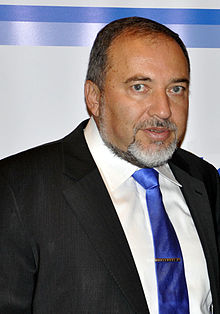9/11:U.S.' Israeli 'Allies' Select Pro Russian Palestinian Genocidist As Defense Minister
Is new defense minister dangerous for Israel? - Al-Monitor: the Pulse ...
www.al-monitor.com/.../israel-yisrael-beiteinu-liberman-defe...
May 23, 2016 - Some in the Israeli military are panicked over Avigdor Libermanheading the ... The Israeli soldier who shot and killed a wounded Palestinian at short .... Interesting thing is that Lieberman is supposed to provide a solid US-Russia link, ..... Bibi Satanyahu fessed up that "9/11 is good for Israel" his words.
Al‑Monitor
Russian thug Avigdor Lieberman named Israeli Defense Minister ...
justsayin.online/.../russian-thug-avigdor-lieberman-named-israeli-defense...
Russian thug Avigdor Lieberman named Israeli Defense Minister. by ... As defense minister, Lieberman – who lives in an illegal settlement in the occupied West Bank – would oversee military operations in the Palestinian territories ...fraud and money laundering and is rumored to have close ties with the Russian mafia.Six Reasons That Avigdor Lieberman Being Named Israel's Defense ...
forward.com/.../israel/.../six-reasons-that-avigdor-lieberman...
May 19, 2016 - Soviet-born, Russian-speaking Lieberman has never made a secret of his desire to improve ties between Israel and Putin's Russia. As doors ...
The Forward
Lieberman to Sputnik: Israeli-Russian Ties to Remain Warm After ...
sputniknews.com/politics/20150316/1019543878.html
Mar 16, 2015 - Lieberman to Sputnik: Israeli-Russian Ties to Remain Warm After Election .... US Military Court to Resume Hearings for Accused 9/11 Plotters.http://www.naturalgaseurope.com/a-new-path-for-russia-to-enter-israeli-gas-market-29848
A PRO RUSSIAN POLITICAN TO BE CONFIRMED ISRAEL DEFENSE MINISTER
Avigdor Lieberman, an ultra-nationalist pro-Russian right-wing politician, is expected to be
confirmed as Israel's next minister for defense, which could influence the development of Israel's
gas industry.
Lieberman was born in Moldova when it was still a part of the Soviet Union and he speaks fluent
Russian. He immigrated to Israel in 1978 at the age of 20. Following a short business career he
became the director-general of the prime minister's office when Benjamin Netanyahu became
prime minister for the first time, exactly 20 years ago this month.
He later resigned this post, established his own party and became foreign minister, a job he held
for six years from 2009. From time to time he left politics and became involved in international
trade particularly with eastern European and Eurasian regimes. His friendship with Vladimir Putin,
the Russian president, is not a secret.

Netanyahu (left) with Putin at their last meeting in Moscow, Russia (credit: the Kremlin)
Opposition to rapprochement with Turkey
During the last few months when Turkey negotiated the rapprochement agreement with Israel,
Lieberman, still in the opposition, sided with the Russian position, opposing the rapprochement
and said that it was better for Israel to strengthen its ties with Greece and Cyprus, two of Russia's
allies in the region. Israel's outgoing defence minister, Moshe Ya'alon, was also against the
rapprochement unless Turkey expelled Hamas operatives from Turkey. Now Lieberman is
expected to support Gazprom's engagement in Israel's natural gas market.
Last week, after Lieberman's appointment, he met – accidentally, according to his associates –
Yossi Abu, the CEO of Delek Drilling and Avner, two Delek Group's subsidiaries, at an upscale
restaurant in Jerusalem. The meeting lasted just a few minutes.
For many years Lieberman has been the main pillar of support for the gas monopoly among
Israel's political elite. Uzi Landau, his party member, who served as energy minister at the
beginning of the decade, opposed all legislation aimed at raising taxes on producers or limiting
their export rights. When those issues were debated and voted in parliament, Lieberman's party
objected, despite being part of the coalition.
Lieberman was defeated on both those issues. Lieberman also supported the natural gas
framework, although his party voted against it in parliament. Lieberman sought the post of
minister for defence, a position now his subject to confirmation by parliament.
Now that his aim has been achieved and the framework has been approved, the Israeli natural
gas
industry might be on a verge of a new, pro-Russian, era.

Avigdor Lieberman (Photo: Wikipedia.org)
Winners and losers
A gas deal with Russia would serve a few of the stakeholders well. Russia would gain an important
geopolitical coup and would bring Israel, a long-time US ally in the Middle East, into its sphere of
influence. It would also enable the Leviathan shareholders to monetize their holdings, something
they could not otherwise do, in the foreseeable future because of gas market conditions; Israeli
officials might find a Russian involvement attractive as it may secure a second connection from
the gas fields to the shore and increase energy security in the country.
A Russian deal would displease the Turkish government who sees Israeli gas as a means of
escaping reliance on Gazprom. It would also displease the US administration which, unlike
Turkey,
would be in a position to try to stop it.
However even if a deal does go through it would not guarantee the development of Leviathan. In
the framework there are no binding obligations on gas companies to develop the gas fields and
there is no mention of sanctions against them if they do not develop the field by 2019. However
bringing Gazprom into play would limit the options of Israeli regulators and the ability of the Israeli
government to act against the gas monopoly if they do not adhere to the framework's guidelines.
Ya'acov Zalel
No comments:
Post a Comment